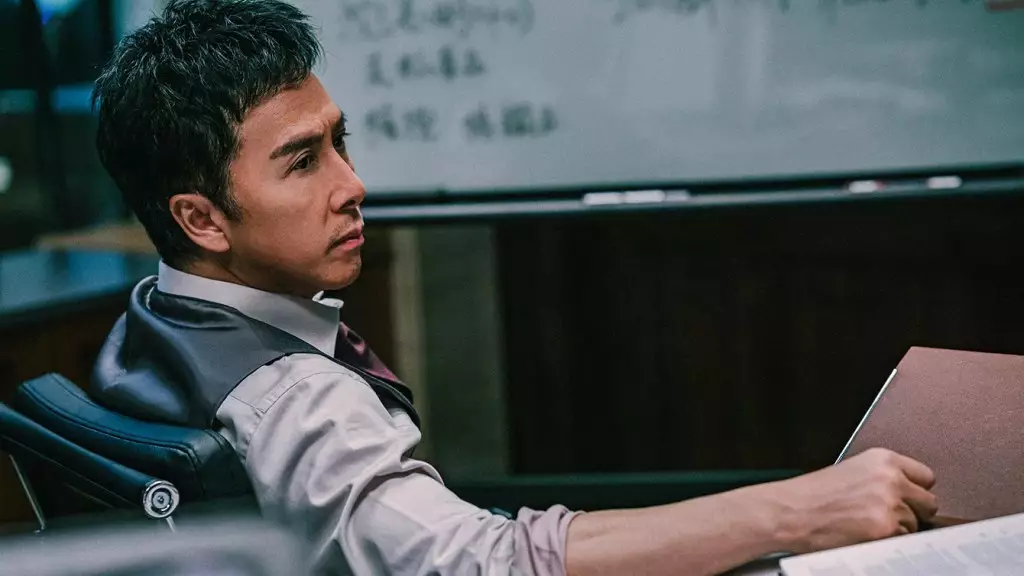In a surprising turn for his illustrious career, Donnie Yen embarks on a new journey with “The Prosecutor,” a film that marries action with courtroom drama. Here, the celebrated martial artist steps into the shoes of Fok Chi Ho, a principled cop who trades his badge for a position at the Department of Justice. Disillusioned with a system that liberates too many criminals, Fok’s determination to seek justice is compelling but also raises questions about the balance between action and advocacy in a genre often dominated by brute force. While Yen’s hardcore fans may yearn for the rapid-fire fight sequences he is known for, “The Prosecutor” resonates differently, offering a narrative that is as much about moral dilemmas as it is about adrenaline-fueled confrontations.
At first glance, “The Prosecutor” appears tailor-made for Donnie Yen, especially as he seeks to diversify his acting repertoire. The film sets up Fok Chi Ho as a relatable character. Unlike his affluent peers, who luxuriate in the privileges that power affords, Fok is portrayed as a man of the people, often engaging in routine activities such as commuting on the subway and dining in humble cafés. This approach not only screens him as a hero rooted in the community but also makes the audience reflect on the poignancy of justice in an urban setting. While Yen’s acting offers assurance, it is his ensemble cast, featuring talents like Francis Ng and Julian Cheung, that infuses vibrancy into the narrative, enhancing the emotional stakes Fok faces.
However, this character examination is often drowned by a deluge of legal jargon and courtroom procedure that can overwhelm viewers. The film’s script, penned by Edmond Wong, is rife with complex legal cases and stipulations, designed to illuminate the stark realities of Hong Kong’s judicial landscape. Yet, these details at times clash with the film’s pacing, particularly for audiences unfamiliar with Cantonese legal practices—leaving them scrambling to understand the unfolding drama.
Despite some action beats, “The Prosecutor” struggles to reconcile its dual identity as a courtroom thriller and an action film. While fans may anticipate the fiery choreography that characterizes Yen’s past films, the narrative leans more into the cerebral aspects of law enforcement and justice. Action becomes a mere spritz of flavor rather than a hearty meal, as the film’s most electrifying sequences often divert attention away from Fok to younger characters like MC Cheung’s Lee. This not only reflects Fok’s developing role but also offers a subtle commentary on experience versus agility in the pursuit of justice.
The film opens with a gripping shootout, thrusting the audience into Fok’s dedication to policing. This introduction plays like a high-octane video game, but soon, viewers find that Fok’s real battles are fought in the courtroom, where the stakes are higher than physical confrontations. Fok’s uncompromising approach to justice, which sees him frequently at odds with his colleagues and frustrates even the judge, raises poignant discussions about procedural integrity versus expedience in the legal process.
The backdrop against which “The Prosecutor” unfolds is equally significant. The film arrives amid palpable tensions in Hong Kong, where recent laws have cast a long shadow on civil liberties. Although it refrains from directly addressing these contentious developments, the underlying themes resonate with the current socio-political climate—the challenges of upholding justice in the face of overarching authority. It underscores an implicit belief that true justice often exists in the gray areas of morality, with Fok epitomizing the struggle between lawful conduct and the drive to achieve what is fundamentally right.
Ultimately, “The Prosecutor” challenges conventional action-drama narratives by prioritizing moral dilemmas over fistfights. While listeners accustomed to Yen’s action-centric roles may find themselves longing for the relished sequences that defined his past works, this film represents a courageous exploration of law and ethics in a complex society. By choosing a path less traveled, Yen not only diversifies his own filmography but also invites the audience to reflect on the intricate layers of justice and how it is delivered. As the credits roll, viewers are left with critical questions about the nature of justice itself and whether righteousness must always yield to the law—a thought-provoking message that lingers long after the action fades.


Leave a Reply